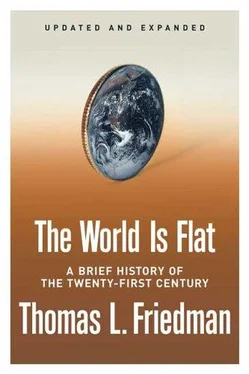“The gains are very much two-way,” said Levin. “Our investigators get substantially enhanced productivity, and the Chinese get their graduate students trained, and their young faculty become collaborators with our professors, who are the leaders in their fields. It builds human capital for China and innovation for Yale.” Graduate students from both universities go back and forth, forging relationships that will no doubt produce more collaborations in the future. At the same time, he added, a lot of legal preparation went into this collaboration to make sure that Yale would be able to harvest the intellectual property that is created.
“There is one world of science out there,” said Levin, “and this kind of international division of labor makes a lot of sense.” Yale, he said, also insisted that the working conditions at the Chinese labs be world-class, and, as a result, it has also helped to lift the quality of the Chinese facilities. “The living conditions of the lab animals are right up to U.S. standards,” remarked Levin. “These are not mouse sweatshops.”
Every law of economics tells us that if we connect all the knowledge pools in the world, and promote greater and greater trade and integration, the global pie will grow wider and more complex. And if America, or any other country, nurtures a labor force that is increasingly made up of men and women who are special, specialized, or constantly adapting to higher-value-added jobs, it will grab its slice of that growing pie. But we will have to work at it. Because if current trends prevail, countries like India and China and whole regions like Eastern Europe are certain to narrow the gap with America, just as Korea and Japan and Taiwan did during the Cold War. They will keep upping their standards.
So are we still working at it? Are we tending to the secrets of our sauce? America still looks great on paper, especially if you look backward, or compare it only to India and China of today and not tomorrow. But have we really been investing in our future and preparing our children the way we need to for the race ahead? See the next chapter. But here's a quick hint:
The answer is no.
Close games for the Americans were rare in previous Olympics, but now it appears to be something the Americans should get used to.
—From an August 17, 2004, AP article from the Athens Olympics titled “U.S. Men's Basketball Team Narrowly Beats Greece”
You could find no better metaphor for the way the rest of the world can now compete head-to-head more effectively than ever with America than the struggles of the U.S. Olympic basketball team in 2004. The American team, made up of NBA stars, limped home to a bronze medal after losing to Puerto Rico, Lithuania, and Argentina. Previously, the United States Olympic basketball team had lost only one game in the history of the modern Olympics. Remember when America sent only NCAA stars to the Olympic basketball events? For a long time these teams totally dominated all comers. Then they started getting challenged. So we sent our pros. And they started getting challenged. Because the world keeps learning, the diffusion of knowledge happens faster; coaches in other countries now download American coaching methods off the Internet and watch NBA games in their own living rooms on satellite TV. Many of them can even get ESPN and watch the highlight reels. And thanks to the triple convergence, there is a lot of new raw talent walking onto the NBA courts from all over the world-including many new stars from China, Latin America, and Eastern Europe. They go back and play for their national teams in the Olympics, using the skills they honed in America. So the automatic American superiority of twenty years ago is now gone in Olympic basketball. The NBA standard is increasingly becoming a global commodity-pure vanilla. If the United States wants to continue to dominate in Olympic basketball, we must, in that great sports cliche, step it up a notch. The old standard won't do anymore. As Joel Cawley of IBM remarked to me, “Star for star, the basketball teams from places like Lithuania or Puerto Rico still don't rank well versus the Americans, but when they play as a team-when they collaborate better than we do-they are extremely competitive.”
Sports writer John Feinstein could have been referring to either American engineering skills or American basketball skills when he wrote in an August 26, 2004, AOL essay on Olympic basketball that the performance of the U.S. basketball team is a result of “the rise of the international player” and “the decline and fall of the U.S. game.” And the decline and fall of the U.S. game, argued Feinstein, is a result of two long-term trends. The first is a steady decline “in basketball skills,” with American kids just wanting to shoot either three-point shots or dunk— the sort of stuff that gets you on ESPN's SportsCenter highlight reel—instead of learning how to make precise passes, or go into the lane and shoot a pull-up jumper, or snake through big men to get to the basket. Those skills take a lot of hard work and coaching to learn. Today, said Feinstein, you have an American generation that relies almost completely on athleticism and almost not at all on basketball skills. And there is also that ugly little problem of ambition. While the rest of the world was getting better in basketball, “more and more NBA players were yawning at the notion of playing in the Olympics,” noted Feinstein. “We have come a long way from 1984, when Bob Knight told Charles Barkley to show up to the second Olympic training camp at 265 pounds or else. Barkley showed up weighing 280. Knight cut him that day. In today's world, the Olympic coach wouldn't even have checked Barkley's weight in the first place. He would have sent a limousine to the airport to get him and stopped at Dunkin' Donuts on the way to the hotel if the player requested it... The world changes. In the case of American basketball, it hasn't changed for the better.”
There is something about post-World War II America that reminds me of the classic wealthy family that by the third generation starts to squander its wealth. The members of the first generation are nose-to-the-grindstone innovators; the second generation holds it all together; then their kids come along and get fat, dumb, and lazy and slowly squander it all. I know that is both overly harsh and a gross generalization, but there is, nevertheless, some truth in it. American society started to coast in the 1990s, when our third postwar generation came of age. The dot-com boom left too many people with the impression that they could get rich without investing in hard work. All it took was an MBA and a quick IPO, or one NBA contract, and you were set for life. But while we were admiring the flat world we had created, a lot of people in India, China, and Eastern Europe were busy figuring out how to take advantage of it. Lucky for us, we were the only economy standing after World War II, and we had no serious competition for forty years. That gave us a huge head of steam but also a huge sense of entitlement and complacency-not to mention a certain tendency in recent years to extol consumption over hard work, investment, and long-term thinking. When we got hit with 9/11, it was a once-in-a-generation opportunity to summon the nation to sacrifice, to address some of its pressing fiscal, energy, science, and education shortfalls-all the things that we had let slide. But our president did not summon us to sacrifice. He summoned us to go shopping.
In the previous chapters, I showed why both classic economic theory and the inherent strengths of the American economy have convinced me that American individuals have nothing to worry about from a flat world-provided we roll up our sleeves, be ready to compete, get every individual to think about how he or she upgrades his or her educational skills, and keep investing in the secrets of the American sauce. Those chapters were all about what we must do and can do.
Читать дальше












